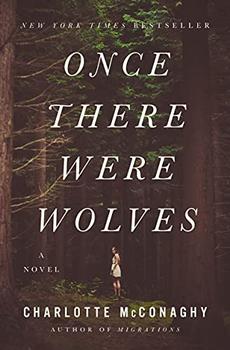Summary | Excerpt | Reading Guide | Reviews | Beyond the Book | Read-Alikes | Genres & Themes | Author Bio

This article relates to Once There Were Wolves
 In Charlotte McConaghy's novel, Once There Were Wolves, the heroine leads a project to reintroduce wolves to the Highlands, the mountainous region of northern Scotland. As they were hunted to extinction around the end of the 17th century, there is a very real debate surrounding the possibility of bringing wolves back to this area, and based on successful efforts already accomplished, some experts consider Scotland a potential model for rewilding campaigns across the globe.
In Charlotte McConaghy's novel, Once There Were Wolves, the heroine leads a project to reintroduce wolves to the Highlands, the mountainous region of northern Scotland. As they were hunted to extinction around the end of the 17th century, there is a very real debate surrounding the possibility of bringing wolves back to this area, and based on successful efforts already accomplished, some experts consider Scotland a potential model for rewilding campaigns across the globe.
What Is Rewilding?
The primary aim of rewilding is to conserve and restore natural environments. This facilitates the development of healthy, balanced ecosystems, which in turn supports species diversity and alleviates the impact of climate change. Ideally, rewilding means minimal human interference, but with deforestation, pollution, habitat loss and extinction so advanced in many parts of the world, specific strategies are being implemented to return the land to nature and kickstart the regenerative process. This includes employing less abrasive agricultural practices, replanting felled woodland and reintroducing key plant and animal species that have been lost.
The Apex Predator Problem
In a survey of the Scottish public, more than three-quarters of respondents backed the idea of increased efforts to rewild the country. Still, the plans continue to meet pushback. While some are inherently resistant to change of any kind, there is particular concern about the proposed reintroduction of apex predators.
An apex predator is defined as a species with no natural predators of its own, meaning it sits at the top of the food chain. Examples once native to Scotland include bears, lynxes and wolves. Many worry about the threat such animals could pose to humans if they were brought back, as well as the likelihood of them attacking livestock, given that rewilding sites tend to be in rural areas where farmland is common.
However, the reintroduction of apex predators is considered a vital part of rewilding. Not only is it restoring a species to its natural habitat, the trickle-down effect benefits the entire ecosystem. As an example, deer numbers in Scotland have soared since apex predators were wiped out. Not only has this led to the need for annual culling — a controversial practice in itself that goes against the idea of minimal interference — but it has had a devastating impact on the landscape and its flora. With deer herds no longer compelled to keep moving to avoid predators, they repeatedly decimate the same grazing sites, which are never given a chance to regenerate. Fewer trees and plant species means less CO2 absorption, as well as less food and habitat space for other animals. This can lead to entire species being squeezed out of an area, sometimes even pushing them to the brink of extinction.
In short, apex predators play a crucial role in keeping the natural cycle of life and death moving in a sustainable way.
Why Scotland?
Rewilding efforts are well underway in many countries, but Scotland often falls into the spotlight for a number of reasons. The country has already overseen the successful reestablishment of several species, including beavers, sea eagles, ospreys and red kites, proving the validity of the approach. Scotland is also considered a prime candidate for rewilding projects because of how much land remains uninhabited by humans — ideal for forest rejuvenation and, perhaps, future habitats for reintroduced predators. Support for "greener" life is also comparatively high in Scotland.
Though simple in concept, rewilding is clearly a complex issue, guaranteed to continue generating fierce debate. To plan the best route forward, it is necessary to consider the land as it once was, as well as the future we want to have. With any luck, however we get there, it will be one in which humans and animals can coexist in greater harmony.
Filed under Nature and the Environment
![]() This "beyond the book article" relates to Once There Were Wolves. It originally ran in September 2021 and has been updated for the
May 2022 paperback edition.
Go to magazine.
This "beyond the book article" relates to Once There Were Wolves. It originally ran in September 2021 and has been updated for the
May 2022 paperback edition.
Go to magazine.
Your guide toexceptional books
BookBrowse seeks out and recommends the best in contemporary fiction and nonfiction—books that not only engage and entertain but also deepen our understanding of ourselves and the world around us.